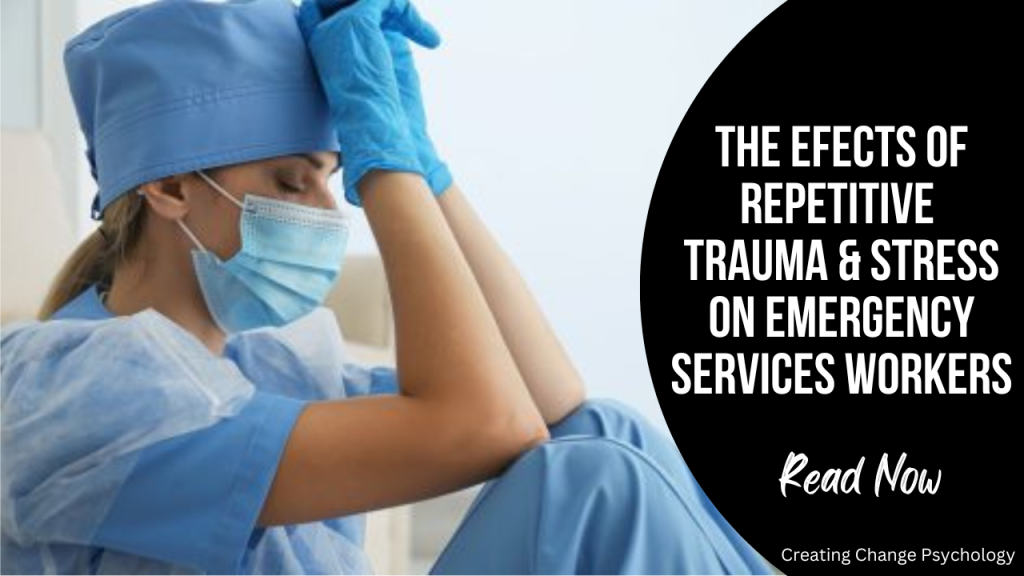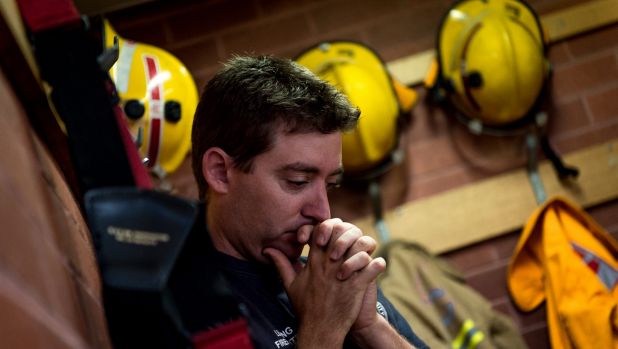If you’re an Emergency Service Worker, you are aware you face a lot of stress, and a unique set of challenges.
Day after day you’re confronted with traumatic situations that most people only see on the news. The repeated exposure to these events doesn’t just have an affect them at work—it can ripple through your personal life, impacting family and your mental well-being. Understanding these effects and learning how to manage them is crucial for both workers and loved ones, so you can feel safe, less anxious and experience reduced stress in your everyday life.

The Hidden Toll of Trauma
Post-traumatic stress disorder (PTSD) is more common among Emergency Service Workers than many realise. In Australia, it’s estimated that at least 8,000 police, fire, and ambulance officers live with PTSD. For these professionals, the trauma isn’t a one-time event; it’s a repeated experience over decades, often lasting anywhere from 20 to 40 years. The culture of stoicism in these fields makes it difficult to manage the emotional aftermath. Internal thoughts like, “I don’t want to burden my family with what happened today,” are often the path taken, and not voiced. Unfortunately, quick fixes like alcohol or distracting yourself with the next crisis will only provide temporary relief, and it leaves the brain and body overwhelmed.

Living in ‘Fight or Flight’ Mode
When trauma accumulates without resolution, the brain can get stuck in a state known as ‘fight or flight’ mode. This response is the body’s natural way of protecting itself, preparing to either confront danger or escape it. For Emergency Service Workers, this response becomes problematic when it doesn’t switch off, even after the danger has passed.
This constant state of alertness can make a person “jumpy” or on edge, quick to become angry, and cause sleep disturbances. Imagine always scanning the room for threats or feeling the need to sit with your back against the wall in a restaurant. Maybe you don’t have to imagine, maybe this is your current reality.
These behaviours are signs that the brain is stuck in survival mode, unable to fully relax or feel safe. Over time, this can lead to social withdrawal, as everyday problems seem trivial compared to the life-and-death situations faced on the job. Without intervention and some professional support, these issues can spiral into PTSD, especially when compounded by irregular sleep patterns and disrupted meal routines due to shift work.
Recognising the Signs and Seeking Help
Recognising the signs of trauma-related stress early is key to seeking the required help. Having a greater understanding of what’s happening can also improve relationships with those around you. Emergency Service Workers are trained to stay focused on their tasks – do you often put your own needs aside. This mindset can make it hard to seek some support externally, as it can be viewed as a sign of weakness. But it’s quite the opposite. It’s a sign of strength.
For loved ones, it’s normal to feel disconnected or unsure about how to help someone close to you. You might wonder, “Will they ever get better?” It’s important to remember that your loved one might feel alone, hopeless, and misunderstood. But with the right approach, things can change, and improve.
Our Psychologists Tips for Reducing the Impact of Trauma
DO:
- Talk about what happened: Ideally, seek professional guidance from someone experienced in trauma (READ ABOUT OUR TRAUMA SUPPORT HERE). It might not be appropriate to discuss specific events in detail with family, however a professional therapist is a great way to talk through your emotions, experiences and symptoms.
- Allow time for recovery: Just as the trauma took time to develop, healing will also take time. Mental health is not a sprint.
- Promote healthy activities: Relaxing activities like walking or swimming all time for the brain to “think” and bring clarity.
- Maintain a routine: Especially with sleep, try to keep a regular schedule, and get 7-8 hours a night. Try stay off screens close to bed time as this stimulates your brain.
- Use support systems: Both for yourself and your family. Often stress and trauma can have a flow on effect in a family, so you all may need some support or someone to talk to during this time.
DON’T:
- Rely on alcohol or drugs: These may offer temporary relief but can worsen the situation in the long run.
- Take on unnecessary stress: Avoid adding extra pressures, whether at work or home.
- Withdraw from social events: Participation in activities and joining in on important events and catch ups with friends or family is beneficial, rather than isolating.
- Ignore the symptoms: They’re likely to get worse if left unaddressed. Reach out for support HERE.
Trauma & Stress Support is Here
At Creating Change Psychology, we understand the unique challenges Emergency Service Workers face. Our team of Clinical Psychologists are ready to offer support tailored to your specific needs, and we have worked with many in your situation over the years, helping them navigate emotions, symptoms and memories. We know that no two experiences or coping styles are the same, and we’re here to help you and your family navigate the effects of repetitive trauma.
Contact us below to start the path to recovery.
Written by Clinical Psychologist Rebecca Deane – www.creatingchange.net.au
Psychology support in the Hills District, Western Sydney & Surrounds (including Rouse Hill, Bella Vista, Glenwood, Castle Hill, Kellyville, The Hawkesbury, Penrith Nepean, Blacktown, Epping, Ryde, Pennant Hills areas and surrounds)

